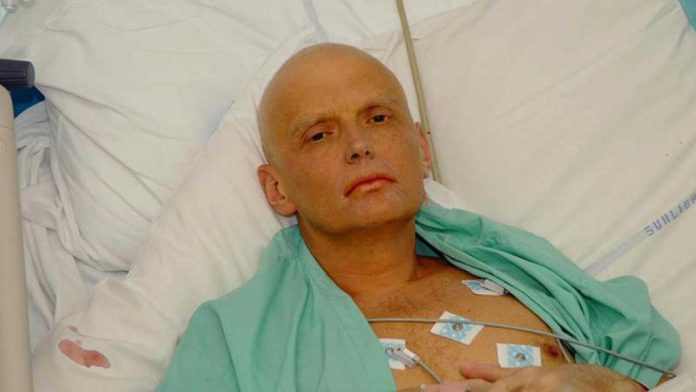(THIS ARTICLE IS MACHINE TRANSLATED by Google from Norwegian)
Theresa May stated in the British Parliament the 12. March that Russia has previously killed Russian ex-agents and defectors, and that therefore "in all likelihood" also Russia has attacked Skripal. British Foreign Minister Boris Johnson clarified and referred to Litvinenko – the former Russian intelligence agent who was killed in 2006 by the poison polonium 210 in England.
The Russian Tea Company
Christopher Steele of MI6 investigated the Litvinenko case. He headed MI6's Russia office from 2006 to 2009. Steele is more famous today for the report he wrote in 2016 on Donald Trump's sex life in Moscow – funded by Hilary Clinton's presidential campaign.
When Steele ended the investigation of Litvinenko poisoning, he claimed that Litvinenko was poisoned by his Russian contacts Andrej Lugovoj and Dmitry Kovtun 1. November 2006 in London.
Traces of radioactive polonium were found on the teapot used when Lugovoj and Kovtun drank tea with Litvinenko on the same November day, and this substance was produced in Russia. This may seem like clear evidence, but why would Russia use a Russian signature killing method? At the same time, we know that Yasir Arafat's body also contained polonium, but no one suspects Russia of this.
The poisoning of Scaramella suggests that Litvinenko was poisoned before the tea company with the Russian agents.
Another track was instead the Italian citizen Mario Scaramella. He had eaten lunch with Litvinenko the same day, and was also poisoned with polonium (but not life-threatening), and obviously not from the same teapot used later that afternoon.
The poisoning of Scaramella therefore indicates that Litvinenko was poisoned before the tea company with the Russian agents Lugovoj and Kovtun. We still do not know who was responsible for the murder of Litvinenko.
Litvinenko in turn first suspected Scaramella. But what motives did Scaramella have? He had previously worked with Nicolo Pollari, who was involved in the counterfeit Niger documents and used to legitimize the war against Iraq in 2003. Scaramella has also been linked to Russian-Israeli smuggling of weapons and nuclear substances.
When it comes to Russian agent Lugovoj, we know that he had been the bodyguard of the Russian businessman and Putin critic Boris Berezovsky, who singled out Vladimir Putin as responsible. Like his former boss, Lugovoj was also not one of Putin's supporters.
Sergey Skripal, Pablo Miller and Christopher Steele
It has been said that Russia would avenge a defender. A traitor must expect to be killed, but if Moscow wanted to kill Sergei Skripal, they could have done this much earlier. He was recruited to British MI6 by Pablo Miller in the early 1990s. Skripal was revealed and imprisoned in Russia in 2004, later to be exchanged for the UK in 2010. Why should Russia kill him in 2018? Why should they have waited for years when Skripal had already given the British all the information they wanted? It's totally pointless.
Skripal was exchanged in 2010 against Russian agents in the United States. Such a system of exchange of agents has worked well for Americans and Russians for decades. Why should Russia sabotage this system? It all seems illogical.
Christopher Steele is more famous today for the report he wrote in 2016 on Donald Trump's sex life in Moscow.
Ambassador Craig Murray and a former British Defense Ministry official, Clive Ponting, give a different answer. They point to the connection between Skripal, Pablo Miller and Christopher Steel's report on Trump's sex life ("Golden shower dossier").
Skripal kept in touch with former British agent Pablo Miller – who also lived in Salisbury. Miller worked, according to The Telegraph, for Orbis Business Intelligence and Christopher Steele, who in 2016 wrote the report on Trump's affairs in Moscow. But Steele had not been to Russia after 1993; he needed help writing the report. Skripal was therefore a natural candidate.
Murray and Ponting say the British government probably signed a Defense and Security Media Advisory Notice (D Notice), which makes it illegal for journalists to write about Skripal's contact with British agents Miller and Steele.
At the same time, Skripal has kept in touch with the Russian embassy. It is perhaps a more likely reason for committing a murder.
See also the main case Major political lies about Russia?


